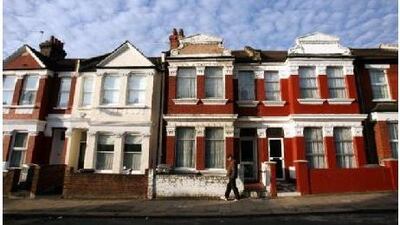I’m thinking of selling my house in London. It ticks all the right boxes – convenient to the City, period features, south-west facing garden, Saturday farmers’ market and good state schools.
Yet the property agents have longer faces than usual. Apparently it may not fly out of the door the way it would have done last spring or early summer.
The housing market in the UK is having a wobble. Sales last month were about half the pre-credit crunch high and the number of mortgages being approved was also down, the latest figures from the Bank of England show.
Over the past six months it has become a buyers’ market and sellers can no longer name their price.
Recent figures from the UK lender Halifax have caused further alarm. They showprices fell by 3.6 per cent last month, wiping about £6,000 (Dh34,785) off the average value of a house.
This is the biggest monthly fall since the index began in 1983 but it is likely to prove to be a statistical blip.
To put the Halifax figures into context, they are based on its own mortgage book and not the whole sector, and figures exclude any cash transactions, which now make up 30 per cent of the market. Add that to the fact that there are much fewer houses changing hands and the Halifax sample size looks small, and therefore subject to greater statistical volatility.
But it does seem fair to conclude that prices have stabilised. The Halifax figures show September quarter prices were down by 0.9 per cent on the previous quarter.
Other indexes also point to a downturn. The Royal Institution of Chartered Surveyors said that last month more surveyors were experiencing falling prices.
And this week Peter Spencer, the chief economic adviser with the Ernst & Young Item Club, a respected financial forecaster, said property values would fall by 5 per cent over the next 12 months.
Mr Spencer’s argument is that the housing market will remain depressed for years to come because banks are refusing to offer affordable loans to first-time buyers.
The coalition government has said it would aim to keep house prices stable. There are no votes in suggesting falling house prices would be a good thing, even when the IMF thinks so. The fund says UK house prices are still too high, based on traditional valuation measures. From 1999 to 2009, the total value of privately owned housing in the UK rose from £1.71 trillion to £3.75tn, according to Halifax. It has declined only 8 per cent since 2007, so there is not much of a correction there.
For those who hoped the recession and financial crisis would finally provide their chance to hop on the housing ladder, being able to afford a property is still as far off as ever.
House prices may be falling but earnings are falling faster. And that is before the 500,000 public-sector job cuts the UK will face in the next few years.
On a crowded island with strict planning restrictions, property has been something of a talisman. Long term, most people still believe that it will appreciate in value and it probably will.
But for the next 10 years house prices may only stagnate and that is no bad thing. The middle-aged and elderly generally have most of their wealth tied up in property, while their children cannot afford to buy at all.
Those who thought they would cash in their nest egg by selling it at inflated price to one of their children’s generation must think again. The average age of an unassisted first-time buyer has risen to 37, the council of mortgage lenders says.
College leavers will be paying off student loans for years and few will be able to afford that and a mortgage.
Perhaps finally we will begin to see our houses for what they should be. A place to live first and foremost.

